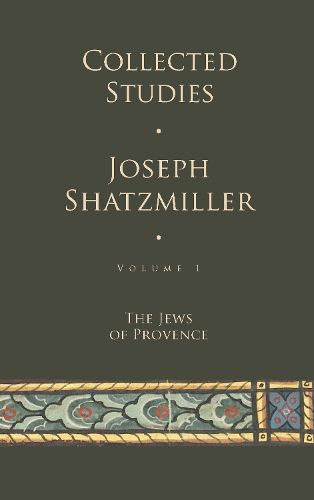Readings Newsletter
Become a Readings Member to make your shopping experience even easier.
Sign in or sign up for free!
You’re not far away from qualifying for FREE standard shipping within Australia
You’ve qualified for FREE standard shipping within Australia
The cart is loading…






InCollected Studies (Volume 1): The Jews of Provence, Joseph Shatzmiller, the foremost expert on Provencal Judaism, offers a comprehensive overview of the medieval history of the Jews in Provence. Through an analysis of community regulations, tax distribution, rabbinic leadership, and everyday life, Shatzmiller provides a rich and powerful mosaic of Jewish society in Provence. This masterful work sheds light on the diverse experiences of Jews in the region, from their interactions with Christian neighbors to their internal conflicts and struggles. With its insightful analysis and meticulous research, The Jews of Provence is an essential read for anyone interested in the history of Jewish communities in medieval Europe.
"The collection of studies that these four volumes offer is the result of morethan sixty years of commitment to scholarship. Like many colleagues, Irelied in the beginning on printed material in books that dealt with law,religion, and secular literature. Then, as a disciple of George Duby, Idiscovered the world of archives and hand-written Latin manuscripts.The present collection relies, to a great extent, on previously unknowninformation discovered during years of search in the archives of SouthernFrance, mostly on those of the county of Provence. They are situated inthe cities of Marseille and Aix-en-Provence as well as the town of Digne.The legal registers of the High Middle Ages (1250-1350) as well as thoseproduced by the counties' administration introduce us to the ordinarypeople of the region, to their daily life and to their preoccupations; theirnames are spelled out, the dates are recorded and the localities in whichthey were active are designated. At times these documents encourage usto endorse information found in contemporary literary sources and toovercome our hesitation and excessive caution concerning their value ashistorical evidence."
$9.00 standard shipping within Australia
FREE standard shipping within Australia for orders over $100.00
Express & International shipping calculated at checkout
InCollected Studies (Volume 1): The Jews of Provence, Joseph Shatzmiller, the foremost expert on Provencal Judaism, offers a comprehensive overview of the medieval history of the Jews in Provence. Through an analysis of community regulations, tax distribution, rabbinic leadership, and everyday life, Shatzmiller provides a rich and powerful mosaic of Jewish society in Provence. This masterful work sheds light on the diverse experiences of Jews in the region, from their interactions with Christian neighbors to their internal conflicts and struggles. With its insightful analysis and meticulous research, The Jews of Provence is an essential read for anyone interested in the history of Jewish communities in medieval Europe.
"The collection of studies that these four volumes offer is the result of morethan sixty years of commitment to scholarship. Like many colleagues, Irelied in the beginning on printed material in books that dealt with law,religion, and secular literature. Then, as a disciple of George Duby, Idiscovered the world of archives and hand-written Latin manuscripts.The present collection relies, to a great extent, on previously unknowninformation discovered during years of search in the archives of SouthernFrance, mostly on those of the county of Provence. They are situated inthe cities of Marseille and Aix-en-Provence as well as the town of Digne.The legal registers of the High Middle Ages (1250-1350) as well as thoseproduced by the counties' administration introduce us to the ordinarypeople of the region, to their daily life and to their preoccupations; theirnames are spelled out, the dates are recorded and the localities in whichthey were active are designated. At times these documents encourage usto endorse information found in contemporary literary sources and toovercome our hesitation and excessive caution concerning their value ashistorical evidence."